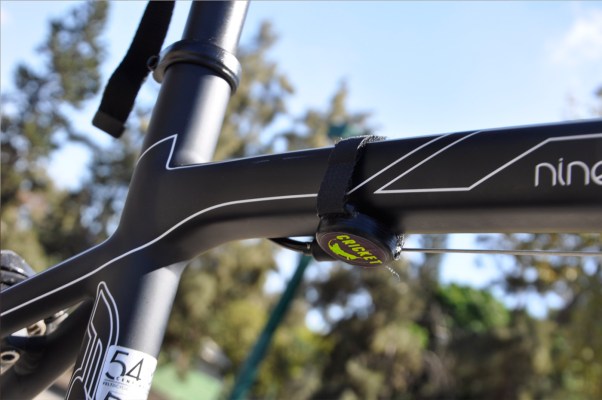Although not a lock per se, The Cricket, which is currently running an IndieGoGo crowd funding campaign, is another attempt to bring a smarter approach to securing your bicycle. In that sense, the smart alarm competes with the likes of Disrupt Europe Battlefield winner Lock8, and San Francisco-based BitLock.
Billed as a lightweight “silent” bicycle alarm, the tiny, 30mm wide and 9mm thick, device weighs 20g and attaches to your bike via a velcro strap, while a more expensive version comes embedded in a U-Lock. It connects to your iPhone via low energy Bluetooth 4.0, acting as a beacon with up to 50 metres in range. That means the device is really only targeting theft detection when you park your bicycle relatively nearby. Powered by its internal 3-Axis MEMS Accelerometer, The Cricket then detects when your bike is being moved or tampered with and sends a push notification to your smartphone that triggers the user definable alarm — appropriately, the default ringtone appears to be the sound of a cricket.
 But, perhaps cleverest of all, is that if your bike lands in the hands of a thief, The Cricket will pool all of its users — should it garner enough scale — to help you track down your bike. Once you mark your bicycle as stolen, every other Cricket user becomes an anonymous sensor, scanning for your Cricket beacon and notifying you instantly upon locating it.
But, perhaps cleverest of all, is that if your bike lands in the hands of a thief, The Cricket will pool all of its users — should it garner enough scale — to help you track down your bike. Once you mark your bicycle as stolen, every other Cricket user becomes an anonymous sensor, scanning for your Cricket beacon and notifying you instantly upon locating it.
That said, there are some obvious trade-offs with a purely Bluetooth approach, sans lock. Once you or your bike is out of range, The Cricket becomes a lot less smart. In contrast, the more expensive Lock8 uses GPS so in theory it can be tracked anywhere in the world. And, in velcro strap form, despite how descretely you attach the device, The Cricket wouldn’t be hard to detach for a thief who knew what they were looking for.
On the plus side, The Cricket’s battery should last for a year, say its makers, and is user replaceable. The startup’s founders, Yariv Bash and Sandy Hefftz, also claim plenty of hardware/software experience, with a background in “space” engineering, apparently.
